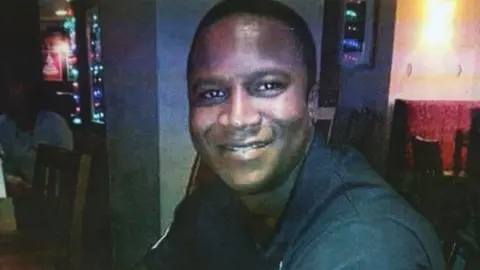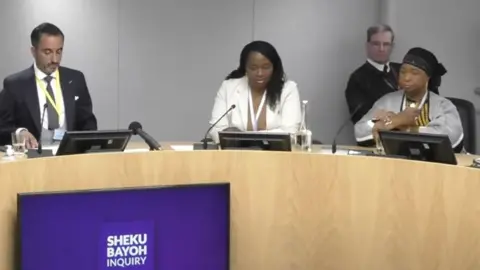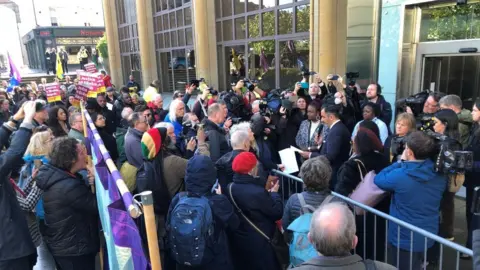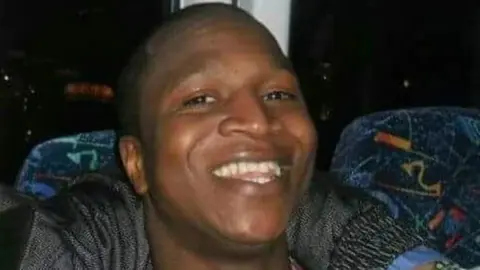Sheku Bayoh: Sister tells inquiry she does not feel safe in Scotland
 BBC
BBCThe sister of Sheku Bayoh has said she no longer feels safe in Scotland, after her brother's death in police custody.
Mr Bayoh, 31, died after being restrained by officers in Kirkcaldy, Fife, in 2015.
Kadi Johnson was addressing the public inquiry into her brother's death. The family believes race played a part, and say they have yet to hear the truth.
Another sister broke down in tears as she recalled her brother as a "fun-loving, cheeky boy" as child.
The public inquiry was announced in 2019 after it was confirmed there would be no criminal charges in the case.
A minute's silence was observed in memory of Mr Bayoh at the start of the first day of the hearings on Tuesday.
The inquiry chairman, Lord Bracadale, said the first statements would focus on the person Mr Bayoh was, and the impact his death had on his family.
"This is not their evidence to the inquiry," he said. "The focus today is on Sheku Bayoh himself and what he meant to those he left behind."
The hearing was briefly suspended after one of Mr Bayoh's sisters, Adama Jalloh, broke down in tears as she remembered growing up with brother.
A video was then shown in which family members and friends paid fond tributes to Mr Bayoh, who came to the UK from Sierra Leone as a child, and was training to be a gas engineer at the time of his death.
Another sister Kadi Johnson later told the hearing that she persuaded her brother to join her in Scotland from London when he was 17 because of the "joy, love and freedom" she had experienced, and because she felt it was a safer place for a young black man to grow up.
"I did not know my brother's life would be cut short at the age of 31," she said.
She went on to say she now felt differently about Scotland and worried for the safety of her family.
"I don't feel safe anymore here in Scotland. I feel nervous and worried for my children, I fear for the safety of my nieces and nephews. Why should I have to feel this way?" she said.
 Sheku Bayoh Inquiry
Sheku Bayoh InquiryThe family's lawyer Aamer Anwar also read a statement from Mr Bayoh's partner Collette Bell, in which she told of their plans for marriage and the impact on his youngest son who was only an infant when Mr Bayoh died.
The day began with a vigil outside the inquiry venue in Edinburgh, attended by more than 100 people including Mr Bayoh's mother who has travelled from Sierra Leone for the hearing.
Mr Anwar told those gathered that seven years and seven days had passed since Mr Bayoh died in police custody.
He said his sister Kadi had no doubt her brother and family would have been treated differently "had Sheku been white".

He continued: "Kadi has described Sheku as Scotland's George Floyd, but 'taking the knee' and 'Black Lives Matter' will mean nothing, if Scotland fails to support justice for Sheku.
"Unlike George Floyd it wasn't one police officer restraining Sheku but at least seven police officers and unlike George Floyd's case, no police officer has ever faced trial for the Sheku's death in custody."
He urged the police officers involved to give a "full and frank" testimony to the inquiry.
"Sheku Bayoh's family have waited a very long time to hear the truth and that is the very least they are entitled to," he said.

Police had been called in the early hours of 3 May 2015 after Mr Bayoh was spotted behaving erratically with a knife in the streets of his home town.
He had taken drugs the previous night, which friends said dramatically altered his behaviour.
According to police statements, by the time the officers arrived at the scene Mr Bayoh no longer had the knife, but he failed to obey instructions to get down on the ground.
Each of the officers used force on Mr Bayoh within seconds of encountering him, including CS Spray and batons.
He then punched PC Nicole Short, who fell to the ground.

Two officers, PCs Craig Walker and Ashley Tomlinson, later told investigators that Mr Bayoh then carried out a violent stamping attack on PC Short while she lay on the ground, a claim reported widely in the media.
However, evidence obtained by the BBC's Panorama programme suggested these accounts may have been false.
Mr Bayoh was restrained on the ground for five minutes before falling unconscious. He was pronounced dead at hospital a short time later.
The inquiry began its work in November 2020. It was set up to examine:
- The immediate circumstances leading to Mr Bayoh's death.
- How the police dealt with the aftermath.
- The subsequent investigation into the death.
- Whether race was a factor.
Earlier this year, lawyers for a number of police officers asked for a guarantee that statements would not be used in any future prosecution.
This was backed by inquiry chairman Lord Bracadale, who said such a step would let officers give "full and frank" evidence to the inquiry - but was opposed by Mr Bayoh's family.
However, the requests were rejected by Solicitor General Ruth Charteris QC, who said the Crown reserved its right to prosecute in all matters related to the case.
In addition, Police Scotland refused to give an assurance that it would not seek to rely on evidence given to the inquiry by an officer in any future disciplinary proceedings against that officer.
The public inquiry hearings are due to continue on Wednesday with opening statements from the main participants, including Police Scotland and the Lord Advocate, Scotland's top law officer.
